中职英语基础模块上册Unittime
- 格式:ppt
- 大小:8.25 MB
- 文档页数:43


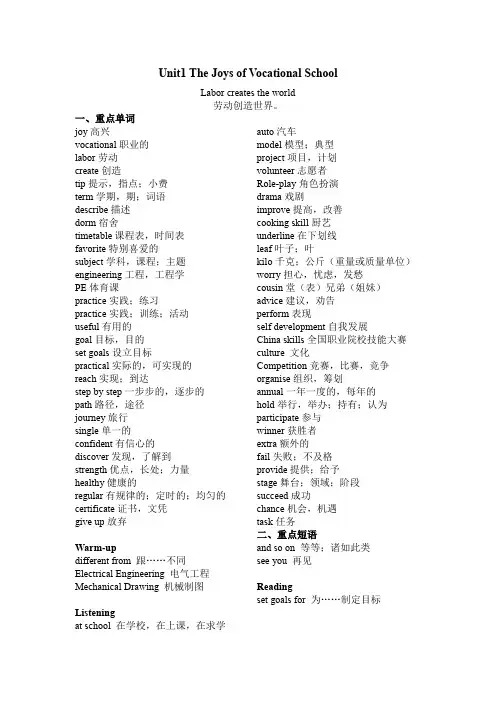
Unit1 The Joys of Vocational SchoolLabor creates the world劳动创造世界。
一、重点单词joy高兴vocational职业的labor劳动create创造tip提示,指点;小费term学期,期;词语describe描述dorm宿舍timetable课程表,时间表favorite特别喜爱的subject学科,课程;主题engineering工程,工程学PE体育课practice实践;练习practice实践;训练;活动useful有用的goal目标,目的set goals设立目标practical实际的,可实现的reach实现;到达step by step一步步的,逐步的path路径,途径journey旅行single单一的confident有信心的discover发现,了解到strength优点,长处;力量healthy健康的regular有规律的;定时的;均匀的certificate证书,文凭give up放弃auto汽车model模型;典型project项目,计划volunteer志愿者Role-play角色扮演drama戏剧improve提高,改善cooking skill厨艺underline在下划线leaf叶子;叶kilo千克;公斤(重量或质量单位)worry担心,忧虑,发愁cousin堂(表)兄弟(姐妹)advice建议,劝告perform表现self development自我发展China skills全国职业院校技能大赛culture 文化Competition竞赛,比赛,竞争organise组织,筹划annual一年一度的,每年的hold举行,举办;持有;认为participate参与winner获胜者extra额外的fail失败;不及格provide提供;给予stage舞台;领域;阶段succeed成功chance机会,机遇task任务二、重点短语Warm-updifferent from 跟……不同Electrical Engineering 电气工程Mechanical Drawing 机械制图Listeningat school 在学校,在上课,在求学and so on 等等;诸如此类see you 再见Readingset goals for 为……制定目标work hard 努力工作(学习)reach one’s goals 达到目标step by step 一步步地begin with 以…开始,从…开始have a bright future 前途光明keep improving 精益求精live a healthy life过健康的生活do regular exercise 定期锻炼get an IT certificate 获取IT证书give up 放弃;投降Speakingmake models 制作模型join a painting club 加入绘画俱乐部play football with friends 和朋友一起踢足球repair autos 修理汽车work on 从事于…;致力于in the playground 在运动场上talk with 与…交谈see you tomorrow 明天见would like to 愿意,意欲after school 放学后make new friends 结交新朋友improve cooking skills 提高烹饪技能Culture cornerbuild one’s dream 造梦National V ocational Students Skills Competition全国职业专业学生技能竞赛the Ministry of Education 教育部China’s vocational education中国职业教育more than 超过the Modern Logistics Integrated Operation现代物流一体化经营give up 放弃;投降provide... for... 提供....have a strong desire to succeed有强烈的成功的愿望in one way or another不管怎样三、重点句子Listening1.—How is your first day at school?—It’s wonderful.2.—What subjects do you have this term?—I have Maths, IT, PE and so on. 3.—What about you?—I have Engineering,Computer and Maths too.4.—Which is your favorite subject?—I like IT best.5.It is time for class.1.—你上学的第一天过得怎么样?—太棒了。
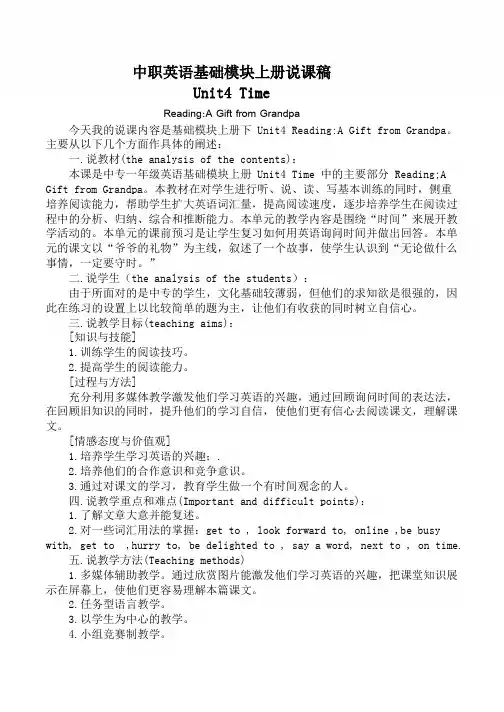
中职英语基础模块上册说课稿Unit4 TimeReading:A Gift from Grandpa今天我的说课内容是基础模块上册下 Unit4 Reading:A Gift from Grandpa。
主要从以下几个方面作具体的阐述:一.说教材(the analysis of the contents):本课是中专一年级英语基础模块上册 Unit4 Time 中的主要部分 Reading;AGift from Grandpa。
本教材在对学生进行听、说、读、写基本训练的同时,侧重培养阅读能力,帮助学生扩大英语词汇量,提高阅读速度,逐步培养学生在阅读过程中的分析、归纳、综合和推断能力。
本单元的教学内容是围绕“时间”来展开教学活动的。
本单元的课前预习是让学生复习如何用英语询问时间并做出回答。
本单元的课文以“爷爷的礼物”为主线,叙述了一个故事,使学生认识到“无论做什么事情,一定要守时。
”二.说学生(the analysis of the students):由于所面对的是中专的学生,文化基础较薄弱,但他们的求知欲是很强的,因此在练习的设置上以比较简单的题为主,让他们有收获的同时树立自信心。
三.说教学目标(teaching aims):[知识与技能]1.训练学生的阅读技巧。
2.提高学生的阅读能力。
[过程与方法]充分利用多媒体教学激发他们学习英语的兴趣,通过回顾询问时间的表达法,在回顾旧知识的同时,提升他们的学习自信,使他们更有信心去阅读课文,理解课文。
[情感态度与价值观]1.培养学生学习英语的兴趣;.2.培养他们的合作意识和竞争意识。
3.通过对课文的学习,教育学生做一个有时间观念的人。
四.说教学重点和难点(Important and difficult points):1.了解文章大意并能复述。
2.对一些词汇用法的掌握:get to , look forward to, online ,be busy with, get to ,hurry to, be delighted to , say a word, next to , on time.五.说教学方法(Teaching methods)1.多媒体辅助教学。

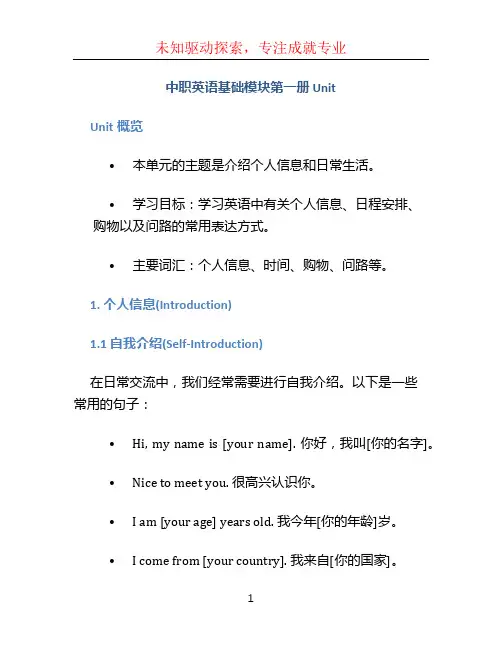
中职英语基础模块第一册 UnitUnit概览•本单元的主题是介绍个人信息和日常生活。
•学习目标:学习英语中有关个人信息、日程安排、购物以及问路的常用表达方式。
•主要词汇:个人信息、时间、购物、问路等。
1. 个人信息(Introduction)1.1 自我介绍(Self-Introduction)在日常交流中,我们经常需要进行自我介绍。
以下是一些常用的句子:•Hi, my name is [your name]. 你好,我叫[你的名字]。
•Nice to meet you. 很高兴认识你。
•I am [your age] years old. 我今年[你的年龄]岁。
•I come from [your country]. 我来自[你的国家]。
•I am a student/worker. 我是一名学生/工作者。
•My hobbies are [your hobbies]. 我的爱好是[你的爱好]。
•I can speak [languages you speak]. 我会说[你会说的语言]。
1.2 个人信息(Personal Information)在日常生活中,我们会被问到一些个人信息。
以下是一些相关表达方式:•What is your full name? 你的全名是什么?•When is your birthday? 你的生日是什么时候?•Where are you from? 你来自哪里?•What is your phone number? 你的电话号码是多少?•What is your email address? 你的邮箱地址是什么?2. 日程安排(Scheduling)2.1 询问时间(Asking for Time)在日常生活中,我们经常需要询问时间。
以下是一些常用的句子:•What time is it? 现在几点了?•Do you have the time? 请问你能告诉我时间吗?•Could you tell me the time, please? 请问你可以告诉我时间吗?2.2 时间表达(Time Expressions)在安排时间时,我们需要使用一些时间表达方式。
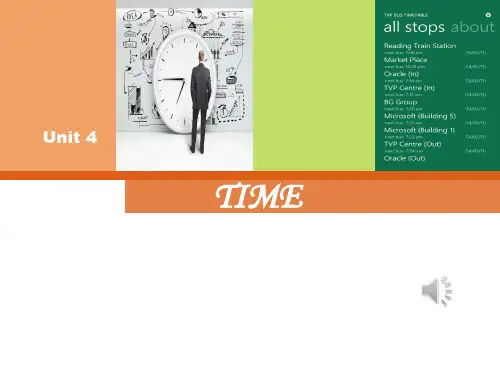
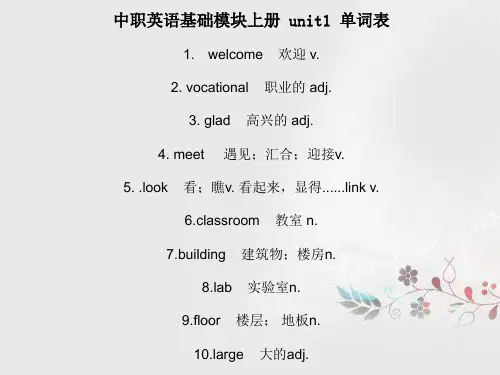


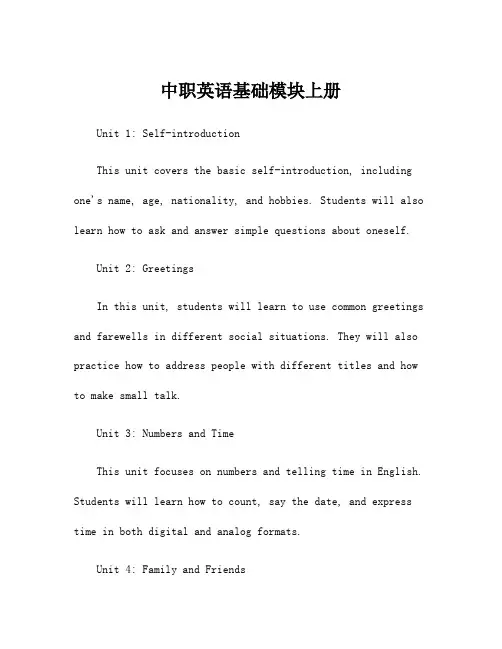
中职英语基础模块上册Unit 1: Self-introductionThis unit covers the basic self-introduction, including one's name, age, nationality, and hobbies. Students will also learn how to ask and answer simple questions about oneself.Unit 2: GreetingsIn this unit, students will learn to use common greetings and farewells in different social situations. They will also practice how to address people with different titles and how to make small talk.Unit 3: Numbers and TimeThis unit focuses on numbers and telling time in English. Students will learn how to count, say the date, and express time in both digital and analog formats.Unit 4: Family and FriendsStudents will learn how to talk about their family members and friends in this unit. They will also practice describing people's appearances and personalities.Unit 5: Daily RoutineIn this unit, students will learn how to talk about their daily routines and activities. They will also learn to use simple present tense verbs to describe habitual actions.Unit 6: Likes and DislikesThis unit covers expressing preferences, likes, and dislikes. Students will practice using adjectives to describe things they enjoy and things they don't like.Unit 7: Health and BodyStudents will learn how to talk about their health, body parts, common illnesses, and giving and asking for simple advice in this unit.。
Unit 4 Time1.because 因为,后跟句子~I didn’t go to school this morning because I was ill.because of 因为,后跟名词、代词、动名词~I didn’t go to school this morning because of the illness.2.enough足够的(1)enough +名词(2)形容词或副词+enough(3)enough to do sth.足够……可以做某事~I have enough books to share with them.我有足够多的书可以与他们分享。
~The watermelon is big enough to share with them.这个西瓜足够大到可以与他们分享。
te晚的be late for...做某事迟到了be+一段时间+late for sth.做某事迟到了多久~He was ten minutes late for class yesterday.昨天他上课迟到了十分钟。
4.angry生气的be angry with sb.生某人的气~Our teacher was angry with us yesterday.我们老师昨天很生我们的气。
5.hear听到hear sb. do sth.听到某人做了某事hear sb. doing sth.听到某人正在做某事~I heard him sing in the next room yesterday.我昨天听到他在隔壁房间唱歌。
~ I hear him singing in the next room。
我听到他正在隔壁房间唱歌。
6.leave离开;留下leave for s.w.离开去往某地leave A for B 离开A地去往B地~My dad will leave for Zhengzhou tomorrow.我爸爸明天将去郑州。
中职英语基础模块第一册unit1. Introduction to UnitThe first unit of the vocational English basic module introduces students to the fundamentals of the English language. This unit serves as a foundation for the subsequent modules, laying the groundwork for essential language skills and knowledge. The unit aims to assist students in developing basic communication skills, understanding grammar structures, expanding vocabulary, and improving listening and reading comprehension abilities.2. Unit ObjectivesThe objectives of this unit are as follows:•To introduce students to basic English grammar structures•To expand students’ vocabulary related to everyday life and common topics•To enhance students’ listening and reading comprehension skills•To develop students’ skills i n basic communication and conversation3. Lesson 1: Greetings and IntroductionsIn the first lesson of Unit 1, students are introduced to common greetings and introductions in English. The lesson focuses on essential phrases and polite expressions used in different social contexts. Students will practice verbal and written exercises, engaging in role plays and dialogues to reinforce vocabulary andexpressions. The aim is to ensure that students are able to confidently greet and introduce themselves in various situations.4. Lesson 2: Numbers and DatesLesson 2 covers numbers and dates in English. Students will learn how to count and pronounce numbers, both cardinal and ordinal, from one to one hundred. Additionally, they will become familiar with different ways of expressing dates, including the day, month, and year format. The lesson includes interactive exercises to reinforce comprehension and practical applications of numbers and dates.5. Lesson 3: Family and RelationshipsIn Lesson 3, students learn vocabulary related to family and relationships in English. They will acquire the vocabulary necessary to describe family members, as well as phrases used to discuss relationships and personal connections. The lesson encourages students to engage in discussions about their own families and relationships, providing practical application of the vocabulary in real-life situations.6. Lesson 4: Daily RoutinesThis lesson focuses on daily routines. Students will learn vocabulary and expressions related to activities in their daily lives. They will practice discussing their daily routines and schedules, as well as forming sentences using appropriate verb tenses. The lesson incorporates various listening exercises and interactive activities to enhance understanding and usage of daily routine vocabulary and phrases.7. Lesson 5: Asking for and Giving DirectionsLesson 5 introduces students to vocabulary and phrases used when asking for and giving directions in English. Students will learn how to ask for and give various types of directions, such as asking for directions to a place or providing directions on a map. They will engage in role plays and practical exercises to reinforce their ability to understand and communicate directions effectively.8. Lesson 6: Time Expressions and AdverbsThe final lesson of this unit covers time expressions and adverbs. Students will learn to express specific times and durations using appropriate vocabulary and adverbial phrases. They will engage in listening exercises and writing tasks to reinforce their understanding and usage of time expressions and adverbs in context.9. ConclusionUnit 1 of the vocational English basic module provides students with a solid foundation in English language skills. By focusing on greetings, introductions, numbers, dates, family, daily routines, directions, and time expressions, students will develop essential communication skills necessary for various real-life situations. The unit aims to build students’ confidence in their ability to understand and use English in a vocational context.。